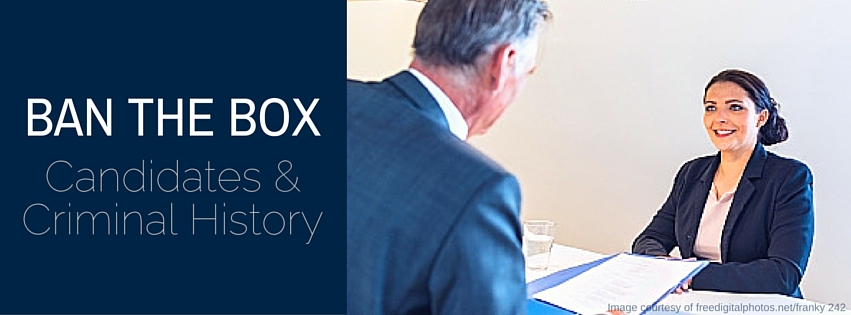Are you aware that as an employer there are laws preventing you from asking certain questions of your candidates? You may be aware that you can’t ask about race, color, religion, sex, disability, age, or ancestry. But are you aware there are rules in many states preventing you from asking about criminal history if it would have no impact on the job duties, and if allowed, usually only after a tentative job offer has been made? These are called “Ban the Box” laws.
The Ban the Box rule prohibits employers from asking potential employees about their criminal backgrounds on job applications or as part of the initial interview process. Once a job has been offered, you MAY be able to ask about their criminal history, and if necessary, rescind the offer of employment if the conviction is applicable to the job duties and responsibilities. For instance, if the position requires driving for the company and the candidate has been convicted of driving under the influence, this is related to the position and therefore, the employer may withdraw the employment offer.
As of 2015, 19 states have implemented “Ban the Box” legislation for public employers with seven states applying the legislation to both public and private employers. Below are the details of the rules in each state (courtesy of National Employment Law Practice):
| State | Employers: Private or Public | Job-related Screening | Statutes |
| California | Public | Cal. Lab. Code § 432.9 | |
| Colorado | Public | There must be a “direct relationship” between the conviction and the job. | CO House Bill 12-1263 |
| Connecticut | Public | Employers must consider the nature of crime and the relationship to the job. | CT Gen. Stat. § 46a-80 |
| Delaware | Public | Employers must consider the nature of offense and the job. | Delaware House Bill 167 |
| Georgia | Public | Executive Order 02.24.15.01 | |
| Hawaii | Private & Public | Conviction must bear “rational relationship” to the position. | Haw. Rev. Stat. § 378-2 |
| Illinois | Private & Public | 820 ILCS 75/1 | |
| Maryland | Public | Senate Bill 4 | |
| Massachusetts | Private & Public | MGLA 151B §4; MGLA 6 § 171A | |
| Minnesota | Private & Public | Conviction must “directly relate” to the position. | MN 364.021 |
| Nebraska | Public | Neb. Rev. Stat. § 48-202 | |
| New Jersey | Private & Public | N.J.S.A 34:6B-11 to 19 | |
| New Mexico | Public | Conviction must “directly relate” to employment. | N.M. Sta. §§ 28-2-1 to 28-2-6 |
| New York | Public | Executive Action | |
| Ohio | Public | Administrative Policy | |
| Oregon | Private & Public | House Bill 3025 | |
| Rhode Island | Private & Public | RI Gen. Law § 28-5-6; 28-5-7 | |
| Vermont | Public | Executive Order 03-15 | |
| Virginia | Public | Conviction must be job-related. | Executive Order 41 |
If you are located in one of the states prohibiting asking about a candidate’s criminal history, under no circumstances try to circumvent this issue. Doing so may be costly in the form of fines and/or penalties from your state’s labor department.
Image courtesy of freedigitalphotos.net/franky 242
